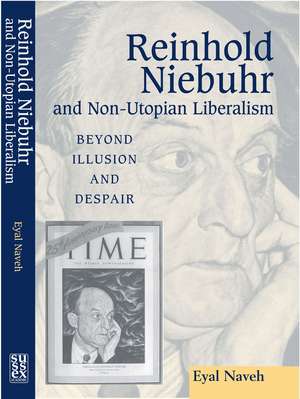Reinhold Niebuhr and Non–Utopian Liberalism – Beyond Illusion and Despair
Autor Eyal Navehen Limba Engleză Hardback – 31 dec 2001
Reinhold Niebuhr was not only the most important American Protestant theologian in the twentieth century but also one of the nation's most influential public intellectuals. The author of a great many books, articles, and essays, impressively wide-ranging in his interests, Niebuhr's writings defined the deepest concerns of entire generations of his fellow-citizens: "Moral Man and Immoral Society" (1932) for the decade of the depression; "The Children of Light and the Children of Darkness" (1944) for the Second World War; "The Irony of American History" (1952) for the Cold War. In a career which spanned the years from World War I to the war in Vietnam, from the era of Woodrow Wilson to that of Lyndon B. Johnson, Niebuhr was never a stranger to controversy. As late as 1966, he and his wife Ursula spoke out against continued escalation of the war in Vietnam, asserting that it would result in "physically ruining an unhappy nation in the process of 'saving' it." One of the many virtues of Eyal Naveh's splendid work is that it places Niebuhr's thought in a broad intellectual context. By examining a wide-ranging group of writers and intellectuals who commented on Niebuhr's work, Naveh succeeds, as no other scholar has in explaining the nature of the "discourse" that arose around the central concept of non-utopian liberalism. Naveh sheds light on how Niebuhr came to reject the notion that people were essentially rational and beneficent, a notion he considered overly idealistic and sentimental. Naveh also explains why Niebuhr's alternative approach was particularly well-suited to crises, and offers an eminently fair-minded appraisal of its strengths and weaknesses. Naveh tells a story at once fascinating, complex, and significant. He begins by showing how non-utopian liberalism originally served as a radical critique of the reform tradition during the New Deal era. Then he demonstrates how in the 1940s and 1950s Niebuhr's view became the dominant outlook of government officials, political theorists, and even social reformers. Naveh next examines the reasons Niebuhr's outlook came under assault from the new left in the 1960s. And finally, he shows quite persuasively how neo-conservative theorists in the 1970s and 1980s, while claiming they had incorporated crucial elements of Niebuhr's outlook into the conservative tradition, had in fact "totally misinterpreted and perverted his message." By examining the discourse that developed around Niebuhr's central ideas, this book helps explain much about the changing contours of American thought in the twentieth century. Naveh appropriately concludes by inquiring into the contemporary relevance of non-utopian liberalism. Reinhold Niebuhr died in 1971; thirty years later the World Trade Center in New York City was destroyed by terrorists. In the aftermath of September 11, Naveh explains, Niebuhr's insight into situations of crisis can indeed invigorate American politics and culture, and may yet serve as an antidote to the illusions and sense of complacency that have too frequently dominated American life in recent decades. - from the Foreword by Richard Polenberg (Cornell University)
Preț: 568.80 lei
Preț vechi: 858.34 lei
-34% Nou
Puncte Express: 853
Preț estimativ în valută:
108.84€ • 118.60$ • 91.71£
108.84€ • 118.60$ • 91.71£
Carte indisponibilă temporar
Doresc să fiu notificat când acest titlu va fi disponibil:
Se trimite...
Preluare comenzi: 021 569.72.76
Specificații
ISBN-13: 9781903900048
ISBN-10: 1903900042
Pagini: 234
Dimensiuni: 167 x 231 x 24 mm
Greutate: 0.5 kg
Editura: Liverpool University Press
ISBN-10: 1903900042
Pagini: 234
Dimensiuni: 167 x 231 x 24 mm
Greutate: 0.5 kg
Editura: Liverpool University Press
Notă biografică
Eyal Naveh lectures in History at Tel Aviv University. He has been a Visiting Professor at Cornell University and UC Berkeley.
